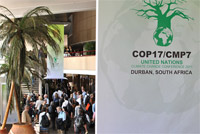Manoj Nadkarni, Programme Manager of Transparency International’s Forest Governance Integrity Programme, reflects on what was and wasn’t achieved at the COP 17 climate governance summit in Durban, South Africa.
At the COP 17 venue, the mood of the NGO observers seemed to veer from cynicism that anything at all was achieved, to exuberance that so many countries are at least sitting together to work on our common future and have come up with what’s being called the ‘Durban platform.’ Personally, I think not much was achieved in Durban in terms of a post-Kyoto global deal: a deal was made so we could leave saying, ‘well at least a deal was made.’
I’m feeling a bit down, as I usually do immediately after a COP, brought on by the recognition of our inability to look beyond our own self-interests. I know I’ll get over it in a day or two, but right now a public statement made by an environment minster of a small island vulnerable to climate change is echoing in my head. He very simply said “we have failed.” He was not referring to his country, nor the present negotiations, but the 15-plus years of attempts to negotiate, make deals and frameworks, to reduce greenhouse gases. In these years we have not reduced, but increased our greenhouse gas emissions. The reduction was what we set out to do, and we didn’t (not couldn’t!) do it. So we all, collectively, failed. Why do we go on with this annual farce? Another member of the same panel, also a minister of a vulnerable country, called it a ‘UN sponsored picnic!’
In terms of forestry and REDD (the Reducing Emissions from Deforestation and Degradation initiative), some slight progress was made in defining funding, but there was no real mention of where the funds would come from. Plus, it looks like offsets are here to stay in spite of some opposition. And most importantly, it is still to be decided where exactly REDD fits into a Durban platform.
Despite this, something truly interesting seems to have happened. Throughout the COP, whenever forest governance issues were mentioned, corruption and the need for transparency were mentioned in the same breath. It seems that corruption is finally out of the closet. At one side event, where big-name panelists and speakers ranged from current and ex-presidents of the USA, to the heads of some of the world’s biggest environmental NGOs, representatives of the private sector, conservation celebrities like Jane Goodall, and the usual smattering of senior UN and World Bank officials, nearly every speaker (including Jane Goodall) mentioned corruption as one of the biggest problems facing forestry governance and identified the lack of transparency as one reason why forest conservation efforts fail.
This is heartening for us because we have been attending the last few COPs presenting one simple message: if REDD is to be effective, forest governance rules and regulations cannot be allowed to be subverted by corruption. Given that forest-rich developing countries face rampant corruption in their forestry sectors, some corrective anti-corruption action needs to be taken, and taken soon, before any on-the-ground REDD implementation starts.
Though our message is simple, the solutions may be complex. Depending on the country, these could include anything from advocacy, training and capacity building to empowering the media or adopting new rules on procurement or access to information. Private sector actors may need to develop a degree of openness that is not usual for them, and international trade may need to be closely monitored.
Yet even here, the first step needed to put these actions in motion is quite simple. Not easy, perhaps, but simple. The first step is being willing to recognise the existence and pervasiveness of corruption and being willing to talk about it.
















 Connect with us on Facebook
Connect with us on Facebook Follow us on Twitter
Follow us on Twitter